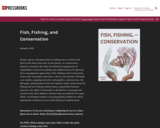
Fish, Fishing, and Conservation is a 389-page, peer-reviewed open textbook intended for undergraduate students who are exploring majors in Fish & Wildlife. It is also relevant to a general audience or for use in courses which explore social and ethical aspects of fish, fishing and conservation.
People, places, and approaches to fishing are as varied as the diverse fish fauna that exist on the planet. As conservation planners recognize the value of substantial engagement of stakeholders in decision making and ineffectiveness of rigid top-down management approaches, Fish, Fishing, and Conservation asserts that all peoples must play a role in conservation. Through case studies, engaging narrative and graphics, and exercises, the text explores major motivations for fishing and non-fishing related values, responsible fisheries practices, the rights of all people to decide how to manage and conserve fish, their habitats, and how they are utilized in the context of overfishing as a pressing global problem for which appropriate solutions are not easily found nor implemented. Introductory chapters examine fish, fishing, and why fish matter and examine the role of values in driving conservation initiatives. Fish and their unique sensory capabilities are described along with a review of recent studies to examine issues of pain, sentience, and learning in fishes living in a foreign, underwater world. The text incorporates these new findings in conservation and management leading readers to evaluate and adopt suitable approaches to ethical reasoning which consider the welfare needs of wild and cultured fishes. Later chapters focus on the role of gender in fishing, conservation organizations, recreational fishing, and a focus on specific fisheries that reveal the principles of conservation and management as they play out in major controversies. Additionally, the textbook contains audio recordings of professional profiles by Virginia Tech students. These are linked at the beginning of each end-of-chapter Professional Profile. Audio recordings are also available on Spotify: https://open.spotify.com/show/06SnqAigflPXUgGNIHZxAX?si=Sljj3q9NRyOcclbmEE3npA
Please let us know if you are reviewing or adopting this book https://bit.ly/fishandconservation_interest
Table of Contents
1. Fish, Fishing, and Why They Matter
2. Values Drive Fish Conservation
3. Sensory Capabilities of Fish
4. Ethical Reasoning and Conservation Planning
5. Pain, Sentience, and Animal Welfare
6. Public Aquariums and Their Role in Education, Science, and Conservation
7. Gender and Fishing
8. Angling and Conservation of Living Fishy Dinosaurs
9. Fly Fishing’s Legacy for Conservation
10. Recreational Fishing and Keep Fish Wet
11. Integrating Fishers in the Management of Arapaima
12. Conserving Tunas: The Most Commercially Valuable Fish on Earth
13. Groupers and Spawning Aggregations
14. Menhaden and Forage Fish Management
15. Takeaways for Successful Fish Conservation
- Subject:
- Applied Science
- Career and Technical Education
- Ecology
- Environmental Science
- Environmental Studies
- Life Science
- Material Type:
- Textbook
- Provider:
- Virtual Library of Virginia (VIVA)
- Author:
- Donald J. Orth
- Date Added:
- 06/20/2023
